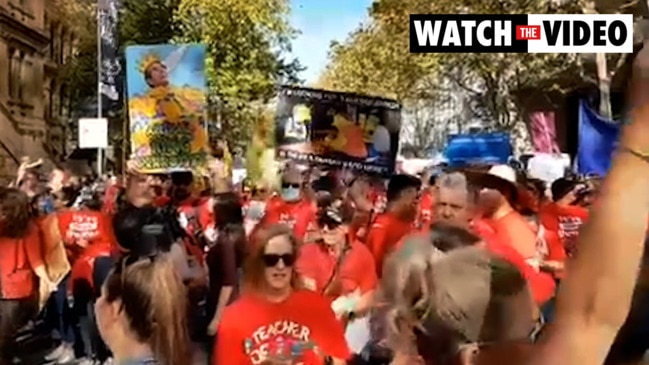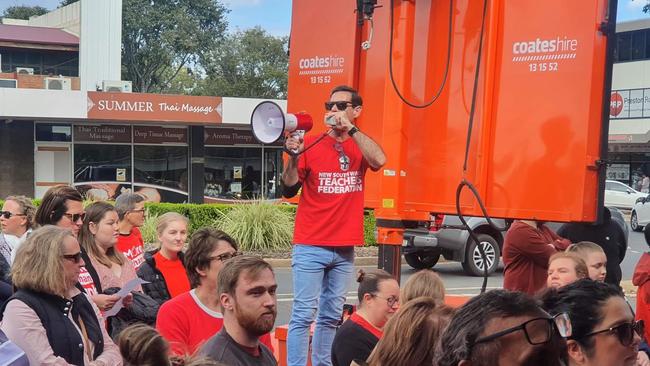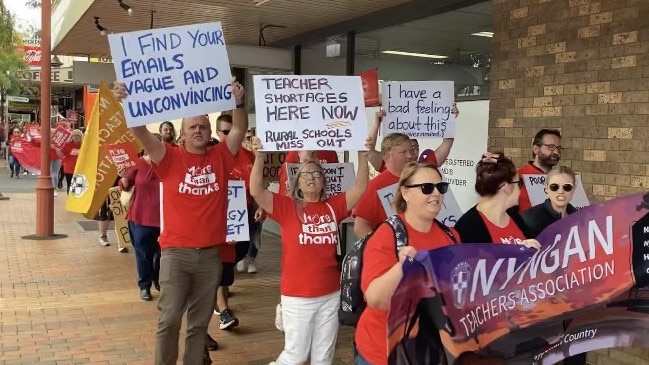Dubbo teachers strike: Plea for increase in wages and decrease in workload
Teachers met at the Dubbo Regional Theatre and Convention Centre on Wednesday as the wrangling between the NSW Teachers Federation and the state government continued.

Dubbo News
Don't miss out on the headlines from Dubbo News. Followed categories will be added to My News.
Public school teachers in Dubbo joined thousands across the state by striking on Wednesday as the wrangling between the NSW Teachers Federation and the state government continued.
More than 200 teachers congregated at the Dubbo Regional Theatre and Convention Centre, five months on from the last statewide industrial action.
The union has two key demands - it’s calling on the government to raise the 2.5 per cent wage cap on teachers’ salaries and it wants teachers allocated an extra two hours of “release time” to plan lessons.
Tim Danaher, the central west organiser for the NSW Teachers Federation, criticised the state government when speaking to The Dubbo News.

“(The industrial action) is an absolute refusal of the government to address the crippling workloads facing teachers and also the lack of teachers coming into the profession,” Mr Danaher said.
“This is due to the wages cap, stagnant wages, it is really impacting and a barrier on teachers coming into the profession.
“The (government) don’t want to spend money, they don’t want to invest and yet they gave themselves a pay rise only a couple weeks ago, well above their pay packets.
“We need more teachers, Dubbo is suffering and the state is suffering.”
Mr Danaher went one step further, taking aim at Member for Dubbo, Dugald Saunders after listening to a recent segment on 2DU radio, where he was asked about the teaching crisis, to which he said Mr Saunders replied, “I’m focused on other things right at the moment to be perfectly honest”.
“Any MP that doesn’t value education in their electorate, should not be in the seat, it’s as simple as that,” Mr Danaher said.
“Education and health are the key components of a functioning society and they are essential services that need to be supported.
“Nurses are doing the same (thing), their workload is excessive, they’re underpaid, and that is the same as our teachers, the workload is absolutely excessive and (they) are very much underpaid for the complexity of their job now.”
However Mr Saunders said his comments had been taken out of context.
“I think that is a sad indictment on the people who have done that but having said that, my regard for teachers is extremely high, literally everyone that works in my office has a teacher as part of their family. I’m constantly talking to teachers about what they want and things that will improve their lot, both as a working environment but also educating our young people.
“This sort of thing isn’t a click your fingers quick fix, the Government is working on solutions and has been for quite some time. I’ve spoken numerous times to the education minister and the premier about this. I just want it to be known from a local member point of view, I absolutely value every single one of our teachers right across the region and the state.”
The rally comes amidst dire teacher shortages with internal Department of Education figures revealing there are nearly 2400 casual vacancies across the state.

The situation is especially bleak in regional and rural NSW with the Dubbo state electorate having 55 casual vacancies, while neighbouring Barwon - including the towns of Coonamble, Bourke and Broken Hill - holds the unwanted honour of the most casual vacancies with 151.
Bree Patton, the President of the Gilgandra Teachers Association and an English and maths teacher at Gilgandra High School, explained the dire circumstances facing rural teachers, echoing Mr Danaher’s sentiments.
“The complexity of our work is increasing, our workload is increasing, teachers are working upwards of 60 hours a week,” Ms Patton said.
“If we don’t take a stand, it’s not just us, it’s also about the students that we stand in front of every day. We need the adequate time to prepare engaging lessons for all the diverse kids we have in our class.
“We also need comparative salaries because there hasn’t been a raise in our salaries since 2004 and if we don’t have (this) we’re not going to get the next generation into teaching.”
Following speeches at the regional theatre, members involved in the industrial action, took to the streets of Dubbo in hopes of pressuring the state government to act now.



